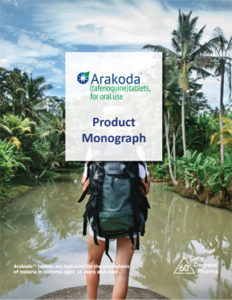
Arakoda
There has long been a need for new drugs for malaria prevention. The existing options were not able to prevent malaria in all endemic regions or protect against multiple types of the disease. Also, none had utility against both the disease-causing and latent forms of the parasites responsible for malaria.
Arakoda® (tafenoquine) tablets, launched in 2019, meets all these needs.1
Important Safety Information
Contraindications
ARAKODA® should not be administered to:
•G6PD deficiency or unknown G6PD status
•Breastfeeding by a lactating woman when the infant is found to be G6PD deficient or if G6PD status is unknown
•Patients with a history of psychotic disorders or current psychotic symptoms
•Known hypersensitivity reactions to tafenoquine, other 8-aminoquinolines, or any component of ARAKODA®
Warnings and Precautions
•Hemolytic Anemia: G6PD testing must be performed before prescribing ARAKODA® due to the risk of hemolytic anemia. Monitor patients for signs or symptoms of hemolysis.
•G6PD Deficiency in Pregnancy or Lactation: ARAKODA® may cause fetal harm when administered to a pregnant woman with a G6PD-deficient fetus. ARAKODA® is not recommended during pregnancy. A G6PD-deficient infant may be at risk for hemolytic anemia from exposure to ARAKODA® through breast milk. Check infant’s G6PD status before breastfeeding begins.
•Methemoglobinemia: Asymptomatic elevations in blood methemoglobin have been observed. Initiate appropriate therapy if signs or symptoms of methemoglobinemia occur.
•Psychiatric Effects: Serious psychotic adverse reactions have been observed in patients with a history of psychosis or schizophrenia, at doses different from the approved dose. If psychotic symptoms (hallucinations, delusions, or grossly disorganized thinking or behavior) occur, consider discontinuation of ARAKODA™ therapy and, evaluation by a mental health professional as soon as possible.
•Hypersensitivity Reactions: Serious hypersensitivity reactions have been observed with administration of ARAKODA®. If hypersensitivity reactions occur, institute appropriate therapy.
•Delayed Adverse Reactions: Due to the long half-life of ARAKODA®
(approximately 17 days), psychiatric effects, hemolytic anemia, methemoglobinemia, and hypersensitivity reactions may be delayed in onset and/or duration.
Adverse Reactions
The most common adverse reactions (incidence ≥1%) were: headache, dizziness, back pain, diarrhea, nausea, vomiting, increased alanine aminotransferase (ALT), motion sickness, insomnia, depression, abnormal dreams and anxiety.
Drug Interactions
Avoid co-administration with drugs that are substrates of organic cation transporter-2
(OCT2) or multidrug and toxin extrusion (MATE) transporters.
Use in Specific Populations
Lactation: Advise women not to breastfeed a G6PD-deficient infant or infant with unknown G6PD status during treatment and for 3 months after the last dose of ARAKODA®.
To report SUSPECTED ADVERSE REACTIONS, contact 60 Degrees Pharmaceuticals at 1-888-834-0225 or FDA at 1-800-FDA-1088 or www.fda.gov/medwatch.
Reference 1. Arakoda® [package insert]. Washington, DC; 60 Degrees Pharmaceuticals LLC: 2018.
Annual deaths from malaria globally
Travelers to malaria endemic regions per annum
Annual dengue infections globally
202-327-5422
1025 Connecticut Ave. NW, Suite 1000, Washington, DC 20036


